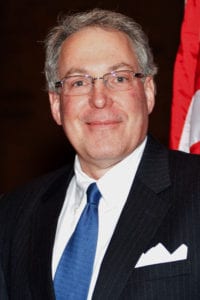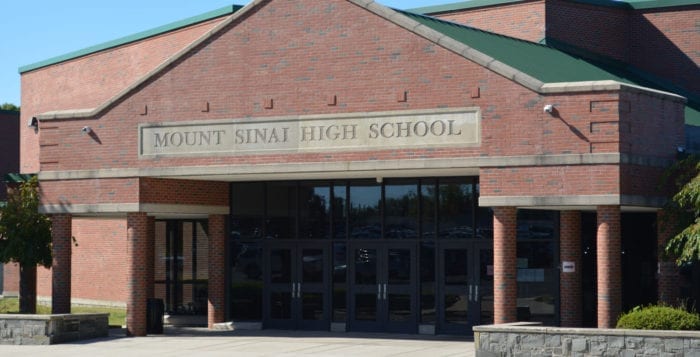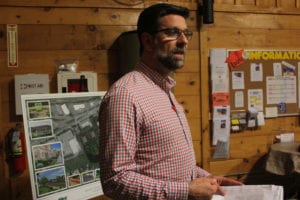In Mount Sinai, four candidates — three incumbents and one newcomer — are vying for three at-large seats on the school board.
 Robert Sweeney
Robert Sweeney
President for five of his six overall years on the school board, Sweeney wants to stay on top of the district’s finances and continue to give the community a voice in how their children are educated.
The father of five and lawyer by trade has lived in Mount Sinai for 15 years and serves on the Eastern Suffolk BOCES advisory committee as well as the executive board of the Maritime Explorium children’s museum in Port Jefferson.
Sweeney said he’s running for a second term as a result of his deep commitment to the school district.
“Mount Sinai doesn’t really have a main street, so the community is the three school districts — that’s where my interest is,” Sweeney said. “I want to continue to be community-involved and have a say in where education is directed. I think the state education department in Albany is trying to take away a lot of the local control of school districts that were always meant to be community based.”
Sweeney said he ran for the board six years ago because he was concerned about taxes in the district. Admitting he was still concerned, Sweeney wants to continue to ease the burden on the taxpayers.
“From day one on the board, I’ve advocated for long-term financial planning,” he said. “While I was president, we never pierced the tax cap … I’ve had my own law practice for 30 years and in running a business, you pay attention to money coming in and going out. We have to understand what revenue we receive in the school district and work within our means.”
 Edward Law
Edward Law
Law has served the board for the past six years, three of which he served as vice president. A former coach in the district’s intramural youth soccer program, he works as a management consultant who helps organizations transform themselves either by implementing computer systems to be more efficient or cutting costs — which, he said, lines up with what he’s brought to the board.
“My involvement over the past six years has brought a lot of transparency and fiscal discipline for the public,” Law said. “We’ve been able to keep our taxes and costs under control to the best of our ability … although the tax cap puts a lot of pressure on us, we’ve been able to expand in a very fiscally-prudent manner. We’ve added a lot of AP classes, implemented full-day kindergarten and the Columbia writing program. Our music and fine arts program has been growing and sports teams have been extremely successful.”
The father of three said, looking ahead, he and the board want to start vocational training programs, mostly revolving around hospital services and culinary arts, so students don’t have to travel to outside schools for college credit.
“I want to stay part of it,” he added about maintaining his seat. “I’d love to continue to be part of helping improve the district. We’ve been pretty darn effective over the past six years.”
 Peter Van Middelem
Peter Van Middelem
A product of the Mount Sinai school district, Van Middelem, who serves as commissioner in the fire district and president of the youth lacrosse program, has lived in the community his entire life. He’s seeking a second term on the board because, he said, he “lives and breathes helping people.”
Van Middelem said he’s proud of the work the board’s done in the last three years — implementing full-day kindergarten, adding components to the music program without piercing the cap — and looks forward to making things even better for students in the district.
“Like anything else, you always want to leave something better than you first found it — we’ve identified different areas we need to improve and I want to continue with that,” he said. “You might see me at a school board meeting, might see me on the back of a fire truck, or at a fire district meeting … I’m just trying to make the community a better place.”
After graduating from Dowling College with an accounting degree in 1996, Van Middelem worked as an accountant for many years before becoming a New York City firefighter in 1999 — where he served for 12 years. He has experience auditing neighboring districts and values communication with others. He has three children, two currently in the district, and his mother and brothers still live in the area, too.
“Mount Sinai is home,” he said. “I love the water, love the people, and love helping to create an environment where kids can excel.”
 Michael McGuire
Michael McGuire
The father of two moved to the community three years ago because of the school district’s reputation. The Port Jefferson native serves as an accountant in his family’s CPA firm, is a former Marine, and served as a police officer in New York City from 2001 to 2008. He recently completed his first year of classes at Touro Law Center in Central Islip.
McGuire decided to run for the board because he believes his professional experiences with auditing and examining financial statements for governments and nonprofits within the CPA firm will provide valuable, and what he sees as much-needed insight into solving the district’s financial problems.
“I’ve gone to the meetings and the district is projected to be broke in two years,” said McGuire, whose one-year-old child will become part of the district in three years. “We have a great district … but there’s a lot of wasteful spending. We need to stop blaming the governor or tax cap and everyone else and look internally on how to save money now to prevent cuts in the future.”
McGuire said it’s unacceptable that the board is presenting a budget with a $1.8 million deficit this year, and said there are plenty of ways to generate revenue.
“A lot of schools have BOCES programs they run at schools and other schools pay tuition to be part of it … the school cut BOCES a few years ago and I’d like to bring it back,” he said. “The school could also rent out fields to PAL or flag football leagues to increase revenue. I want to make sure the school can keep being amazing without worrying about having to cut things to keep it running.”








 Robert Sweeney
Robert Sweeney Edward Law
Edward Law Peter Van Middelem
Peter Van Middelem Michael McGuire
Michael McGuire


